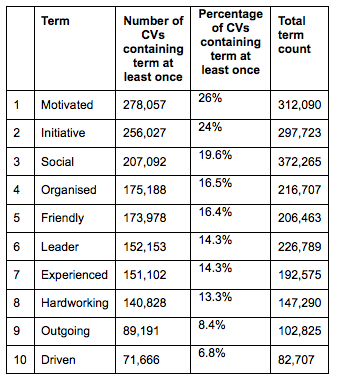Analysis of over 1.1 million UK CVs has revealed the most common CV buzzwords seen by prospective employers. Job search engine Adzuna has scoured through the CVs on its platform to bring to light the UK’s most common job-hunting clichés, revealing the number of CVs in which they appear, and the amount of times the words or phrases have been used in total.
- ‘Motivated’ is the most cited feature in UK CVs, found in over a quarter (26%) of those analysed.
- ‘Initiative’ and ‘Social’ also feature heavily, found in 24% and nearly 20% of CVs respectively.
- Job search engine Adzuna shares top 10 buzzwords in UK CVs and tips for ensuring your own doesn’t become a ‘CV Cliché’ that turns off employers.
Work ethic and a good attitude are clearly important skills to demonstrate for UK job hunters, with ‘motivated’ topping the list as the most used buzzword in UK CVs. ‘Motivated’ features in over a quarter of CVs (26%) analysed, appearing 312,000 times in total.
‘Initiative’ follows closely behind, featuring in 24% – equating to over 256,000 CVs. ‘Social’ also appears in nearly one fifth of all CVs analysed. The word, which could refer to either social-media skills, socialising or other social skills, commonly appears more than once in CVs. The term is used 372,265 times in total, more than any other CV skill.
Less commonly used words include ‘assertive’, found in just 8,171 CVs followed by ‘good sense of humour’ and ‘fun’ featuring in just 19,000 and 23,000 respectively.
Andrew Hunter, co-founder of Adzuna, commented: “Job hunters have a fine balance to strike when it comes to crafting a great CV. Whilst many employers now look for keywords in applications to help refine lists of applicants, it’s important to choose your skill-set and attributes wisely. Moving away from recycled buzzwords like ‘motivated’ and ‘initiative’ could be the very factor that sets your own CV apart from someone else’s.
“When choosing words to describe yourself and your skill-set, consider the kind of skills that are really relevant for the exact industry and job role that you are applying for – that way, the key things your employer is looking for will be covered and you’ll have avoided a lot of the repetitive words that can turn off a prospective employer.”
Andrew Hunter’s top tips for crafting a great CV include:
1. Customise your CV for every role you apply for
It may seem time consuming, but ensuring your CV is tailored to every company and every role that you apply for is important as prospective employers need to be assured that you haven’t sent the same CV to 100 other companies. To do this, you need to demonstrate that you are a good match for a company and role. Study the job advert or specification, and tailor your own experience to the request. If you don’t necessarily have the experience, focus on transferable skills to provide evidence that you have the qualities they are looking for.
2. Be ruthless – ditch irrelevant information
Potential employers usually have a finite amount of time to read CVs, so don’t include any experience that isn’t relevant. For example, if a position you held five years ago was completely irrelevant to the role you’re applying for today, don’t waste valuable space talking about responsibilities and duties you had that do nothing to improve your application (but do leave the dates in there so you don’t have unexplained absences).
3. Include hobbies and interests that suit the role you’re applying for
‘Social’ is one of the most commonly used words on CVs according to our data, so there’s clearly an increasing onus on demonstrating that your social life and personality are a good fit for the role and the company culture. For example, if you are applying for a role as a sales person, you may wish to include hobbies that demonstrate your competitive, outgoing nature – this is the time to mention a team sport you excel at, or your active participation in the university debating team (rather than use valuable space telling them that you quite enjoy reading).
4. Include a profile summary
This is a few sentences or bullet points (up to 200 words), right at the top of the first page, illustrating the unique selling points that make you a perfect match for the role. Ensuring you update this for every role ticks the ‘customised CV’ box. Clearly outline the kind of role you are applying for and why, try to include the top three most relevant skills briefly in this section and expand further down in the CV.
5. Proof, proof and proof again (then ask a friend)
Errors, typos and spelling mistakes are a massive turn off for employers and provide an easy excuse to reject your application (and speed up their shortlisting process). Print off your CV and proof your work slowly and meticulously. Then, once you’ve done that, ask a friend or family member to proof it for you.
To learn more about how to improve your CV, visit the Adzuna website
















